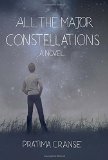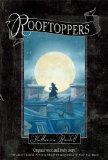Summary | Excerpt | Reviews | Beyond the book | Read-Alikes | Genres & Themes | Author Bio

The fairy tale "mash-up" genre - in which multiple fairy tale stories, themes, or characters are combined into one new and original tale - can be delightful when it's done well or derivative when it's done carelessly. When it's done playfully and inventively - as it is in Alethea Kontis's novel, Enchanted - the results can be simply, well, enchanting.
Sunday Woodcutter is the seventh daughter born to her parents - who are each a seventh son and a seventh daughter respectively - and so, as any fairy tale aficionado could tell you, she is destined for great things. However, Sunday - who tends to look at the world through less rosy lenses - sees things differently: "I am doomed to a happy life," she writes in the novel's opening sentence. With six older sisters (Monday through Saturday, of course) whose dramas overshadow her own quiet talents, it's easy for Sunday to feel that she's condemned not only to happiness and contentment, but also to obscurity.
Sunday loves writing stories - although she has to do so carefully since her writing, no matter how inventive or even outlandish, has a disturbing tendency to come true. But no one in her remarkable family cares for Sunday's stories. So when she encounters Grumble, an enchanted talking frog who would listen to her stories all day if he could, Sunday can't quite believe her good fortune. Although she would never label what she feels for Grumble "true love," magic knows better... and soon Grumble turns back into a handsome prince - but one whose tangled history with the Woodcutter family makes him the worst possible suitor for Sunday's hand.
In classic fairy tale fashion, the prince (who's now known as Rumbold) stages a series of balls in an attempt to get close to Sunday - and to win her heart as a man, not as a frog. But can Sunday, who only knows part of her family's history, recognize Rumbold for who he is... and forgive him for who he was?
Enchanted starts out - and in many ways remains - light-hearted and even funny, as it appropriates several fairy tale plots, from "Jack and the Beanstalk" to "The Princess and the Pea" to "Cinderella" and, of course, "The Frog Prince." Sunday's perspective is wry and funny, and Rumbold's point of view is endearingly uncertain, as he is eager to please. But, like the fairy tales of the Grimm Brothers, Enchanted also has a dark side, one that increasingly emerges as the story progresses and the stakes of Sunday's relationship with Rumbold - and the fates of her sisters - grow deeper and ever darker.
Alethea Kontis's novel simultaneously offers readers the joy of recognizing old favorites in new clothing and the pleasure of discovering something entirely original and new. If Sunday is doomed to a happy life, her readers are blessed with an equally happy romp through a fairy tale landscape both familiar and unexpected.
![]() This review was originally published in The BookBrowse Review in May 2012, and has been updated for the
June 2013 edition.
Click here to go to this issue.
This review was originally published in The BookBrowse Review in May 2012, and has been updated for the
June 2013 edition.
Click here to go to this issue.

If you liked Enchanted, try these:

by Pratima Cranse
Published 2015
When you're about to face the world, who do you turn to?

by Katherine Rundell
Published 2014
Embrace possibility in this luminous novel about a girl in search of her past who discovers a secret rooftop world in Paris.
Your guide toexceptional books
BookBrowse seeks out and recommends the best in contemporary fiction and nonfiction—books that not only engage and entertain but also deepen our understanding of ourselves and the world around us.